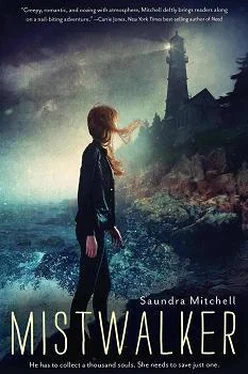Those went to the attic. I made his bed. I left the curtains half open, all his drawers completely closed. And I stacked his sheet music on his desk.
Levi wasn’t coming back. Every time I went in there, I went in knowing that. He didn’t need his Death Note figures anymore. He wasn’t gonna screw up the alphabetical order on his shelves ever again. He didn’t care if I made his bed wrong; it made no difference if I arranged his shoes with the right one on the left.
He wasn’t at the graveyard, and he wasn’t in that room anymore.
Still, sometimes, it felt like he should have been somewhere. Alone, outside, at night. That’s when I missed him. That’s when I felt absence, the presence of nothing. The first couple weeks after he died, I dreamed him. We were always outside. Walking to the wharf. Climbing down in the caves. Watching the harbor seals on the shore.
When I dreamed him ordinary like that, it hurt when I woke up. It was an ugly trick of the brain. Dreams resurrected Levi; waking put him back in the grave.
He’d always been one door over from me, even when he was brand new. There was a picture of me, all of two years old, on an ugly couch that moved to our garage a couple years back.
Somebody had put Levi in my arms—I was a little kid, and he was a big baby. He filled my whole lap. My hand rested on his downy head, and he dozed away, unafraid. I was nothing but a pink triangle of a nose and a fall of hair.
I didn’t know him then. And I didn’t know him the last time I held him either. Like all the doors on Thaxter Street, his was closed. I knew the foyer, but the rest was a mystery. It always would be.
Instead of going home, I walked down to the water. Fog drifted in, and the lighthouse beam cut through the night. Sitting on the rocks, I shivered in the dark. It wasn’t comfortable, and I was gonna have to bolt sooner rather than later. But I wanted a minute. Some quiet.
If I’d told Levi about Grey, he would have believed me. Probably would have written a song about it. Maybe even waited for me after school to ask more questions that would have turned into a comic book. He probably would have named the character in the book Emma, though. He’d had the hots for Emma Luchies since second grade.
Covering my face with my hands, I breathed heat onto my own skin. Levi was gone, but parts of him remained. Shadows, glimmers—unmade memories built on expectations. For just a moment, I wasn’t alone. And then, just as quickly, I was.
Waiting for the light to pass overhead again, I wondered if I could sleep in a town without a beacon at night. Nick said it took him forever to get used to Broken Tooth because he didn’t have train tracks behind his house.
It was funny, the things you could live with and the things you learned to live without.
The fog comes and goes on its own now. I feel its currents. I could direct its tide. I won’t. I’m not. Instead, I stand in the lantern gallery and watch the shore. All those flickering lights, just out of my reach. All those flickering lives, going on and on without me.
One hundred years.
I asked for evidence of myself once. I wanted proof that I had been someone before Susannah’s kiss. That my life was no imaginary thing. And this after I had loathed it so much in the living. After hating my father and his dreams for me. After hoping to flee my mother at the very first opportunity. I wished for evidence of it; I no longer believed I’d been real.
The curse provided. Inside the gold-wrapped gift at my breakfast that morning were two slips of newsprint.
My father’s obituary was a plain affair. He passed fifteen years after I surrendered my soul to the mist. He died in his sleep, the memoriam said; he was survived only by his beloved wife.
A grainy photograph immortalized my mother in her obituary. So claimed the caption. The woman depicted there was decades older than I remembered her. She wore black; she looked past the camera.
When I saw it, I felt only numb. I studied the angles of her face. Surely I should remember the sound of her voice. At least one thing she’d said to me. Perhaps the texture of her hands—had they been cool and soft?
The color of her eyes remained clear in my memory, but time had shaved away the rest of her details. After the description of her good works, the obituary said she was survived by a son, missing since 1913.
Until the end, she had hope. Until the last of her, she refused to believe in the last of me.
All the while, I sat on this hellish island. A century past, and I am no better, no greater, no more finished, than I was then. Here I sit, staring at an unfinished music box, suffering an existential crisis.
I’m a frigid, prisoned Hamlet—I have no choice but to be. But I am haunted by the awareness that I cannot be. There’s but one in the world that could acknowledge me. The same one that would make me real again.
Longing breaks through my ice; it’s painful and bloody. I press my hands to it. Though I know it will mean nothing at my plate in the morning, I wish for the impossible. I wish for Willa. I wish for her to come.
Another voice in this tomb is sometimes enough.
I went to school. Not because I cared, but because I had nowhere else to go.
My mother had the day off. I’d missed the low tide. Somebody had bought the boat in Milbridge, and Daddy left before dawn. Landlocked, it was easier for me to avoid looking to the lighthouse. I could bury myself in make-up work.
The air was molasses, thick and hard for me to walk through. Usually, the halls at Vandenbrook echoed like crazy. If you turned the right way in the English room, you could hear math lessons drifting up from the first story. Since it was a mansion once, it only seemed right. Couldn’t have a gothic mystery in a house that was soundtight and echoproof.
But on the day before my court date, the halls sounded hollow. Voices wound around me, sounding like they’d been shouted down a pipe, miles and miles away.
“Where have you been?” Ashley Jewett asked. She peeled off the wall to walk with me.
With a shrug, I said, “Around.”
Eyes darting, Ashley leaned in close. “Have you talked to Seth lately? You know me. You know I don’t like to start drama. But . . .”
Though it wasn’t a lie in the standard way, it wasn’t true, either. Ashley loved drama. She got all the tabloids online, she had Oh No They Didn’t on permanent scroll .You could tell when it was a bad signal day for cells if Ashley was leaning out a window with her phone.
For twelve seconds in ninth grade, she tried to get a gossip site about Broken Tooth going. Everybody knew it was her, and it wasn’t like we didn’t catch most news as it happened. She shut it down and rededicated herself to going person-to-person instead. It was tradition, and it worked. Mostly. She seemed to have skipped a link on my personal chain.
“We broke up,” I told her.
Visibly deflating, Ashley pursed her lips. She was going to salvage something out of this. “For real, or just on a break?”
As if it was that neat. He still had my DVDs. I still had a bunch of his shirts. We hadn’t signed a contract. We hadn’t even really said it was over. I just knew it was, and so did he.
Rather than scent the water with blood, I caught Ashley’s hand and squeezed it gently. “If you saw him with somebody else, it’s all right.”
It wasn’t. My stomach soured; not that I wanted to go back, but I didn’t want to see him dating Denny. If he wanted to get his flirt on, he could go to Bangor. Hang out in front of a movie theatre, show off by throwing popcorn in the air to catch in his mouth. He got plenty of attention doing it when I was there. Without me, it would be a silver bullet.
Читать дальше












